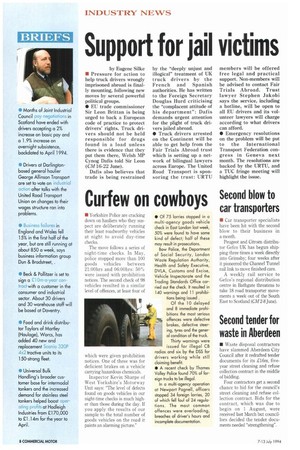Curfew on cowboys
Page 10

If you've noticed an error in this article please click here to report it so we can fix it.
• Yorkshire Police are cracking down on hauliers who they suspect are deliberately running their least roadworthy vehicles at night to avoid day-time checks.
The move follows a series of night-time checks. In May, police stopped more than 100 goods vehicles between 21:00hrs and 06:00hrs: 50% were issued with prohibition notices. The second check of 98 vehicles resulted in a similar level of offences, at least four of which were given prohibition notices. One of these was for deficient brakes on a vehicle carrying hazardous chemicals.
Inspector Kevin Sharpe of West Yorkshire's Motorway Unit says: ''The level of defects found on goods vehicles in our night-time checks is much higher than those during the day. If you apply the results of our sample to the total number of goods vehicles on the road it paints an alarming picture."
• Of 75 lorries stopped in a multi-agency goods vehicle check in East London last week, 50% were found to have some kind of defect; half of these may result in prosecutions.
Bow Police, the Department of Social Security, London Waste Regulation Authority, Health and Safety Executive, DVLA, Customs and Excise, Vehicle Inspectorate and the Trading Standards Office carried out the check. It resulted in 140 warnings and 11 prohibitions being issued .
Of the 10 delayed and 8 immediate prohibitions the most serious Ni offences were defective brakes, defective steering, lyres and the general condition of the truck.
Thirty warnings were issued for illegal CB
radios and six by the DSS for drivers working while still claiming benefit.
• A recent check by Thames Valley Police found 70% of foreign trucks to be illegal.
In a multi-agency operation at Newport Pagnell, officers stopped 34 foreign lorries, 20 of which fell foul of 24 regulations. The most common offences were overloading, breaches of driver's hours and incomplete documentation.
































































































